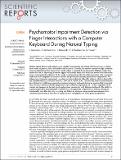| dc.contributor.author | Giancardo, Luca | |
| dc.contributor.author | Sanchez Ferro, Alvaro | |
| dc.contributor.author | Butterworth, Ian Richard | |
| dc.contributor.author | Sanchez Mendoza, Carlos | |
| dc.contributor.author | Hooker, Jacob M. | |
| dc.date.accessioned | 2015-06-08T18:28:26Z | |
| dc.date.available | 2015-06-08T18:28:26Z | |
| dc.date.issued | 2015-04 | |
| dc.date.submitted | 2014-12 | |
| dc.identifier.issn | 2045-2322 | |
| dc.identifier.uri | http://hdl.handle.net/1721.1/97224 | |
| dc.description.abstract | Modern digital devices and appliances are capable of monitoring the timing of button presses, or finger interactions in general, with a sub-millisecond accuracy. However, the massive amount of high resolution temporal information that these devices could collect is currently being discarded. Multiple studies have shown that the act of pressing a button triggers well defined brain areas which are known to be affected by motor-compromised conditions. In this study, we demonstrate that the daily interaction with a computer keyboard can be employed as means to observe and potentially quantify psychomotor impairment. We induced a psychomotor impairment via a sleep inertia paradigm in 14 healthy subjects, which is detected by our classifier with an Area Under the ROC Curve (AUC) of 0.93/0.91. The detection relies on novel features derived from key-hold times acquired on standard computer keyboards during an uncontrolled typing task. These features correlate with the progression to psychomotor impairment (p < 0.001) regardless of the content and language of the text typed, and perform consistently with different keyboards. The ability to acquire longitudinal measurements of subtle motor changes from a digital device without altering its functionality may allow for early screening and follow-up of motor-compromised neurodegenerative conditions, psychological disorders or intoxication at a negligible cost in the general population. | en_US |
| dc.description.sponsorship | Comunidad de Madrid | en_US |
| dc.language.iso | en_US | |
| dc.publisher | Nature Publishing Group | en_US |
| dc.relation.isversionof | http://dx.doi.org/10.1038/srep09678 | en_US |
| dc.rights | Creative Commons Attribution | en_US |
| dc.rights.uri | http://creativecommons.org/licenses/by/4.0/ | en_US |
| dc.source | Nature Publishing Group | en_US |
| dc.title | Psychomotor Impairment Detection via Finger Interactions with a Computer Keyboard During Natural Typing | en_US |
| dc.type | Article | en_US |
| dc.identifier.citation | Giancardo, L., A. Sanchez-Ferro, I. Butterworth, C. S. Mendoza, and J. M. Hooker. “Psychomotor Impairment Detection via Finger Interactions with a Computer Keyboard During Natural Typing.” Sci. Rep. 5 (April 16, 2015): 9678. | en_US |
| dc.contributor.department | Massachusetts Institute of Technology. Research Laboratory of Electronics | en_US |
| dc.contributor.mitauthor | Giancardo, Luca | en_US |
| dc.contributor.mitauthor | Sanchez Ferro, Alvaro | en_US |
| dc.contributor.mitauthor | Butterworth, Ian Richard | en_US |
| dc.contributor.mitauthor | Sanchez Mendoza, Carlos | en_US |
| dc.contributor.mitauthor | Hooker, Jacob M. | en_US |
| dc.relation.journal | Scientific Reports | en_US |
| dc.eprint.version | Final published version | en_US |
| dc.type.uri | http://purl.org/eprint/type/JournalArticle | en_US |
| eprint.status | http://purl.org/eprint/status/PeerReviewed | en_US |
| dspace.orderedauthors | Giancardo, L.; Sanchez-Ferro, A.; Butterworth, I.; Mendoza, C. S.; Hooker, J. M. | en_US |
| dc.identifier.orcid | https://orcid.org/0000-0002-8784-1624 | |
| dc.identifier.orcid | https://orcid.org/0000-0002-8568-7432 | |
| dc.identifier.orcid | https://orcid.org/0000-0002-4862-2277 | |
| mit.license | PUBLISHER_CC | en_US |
| mit.metadata.status | Complete | |
